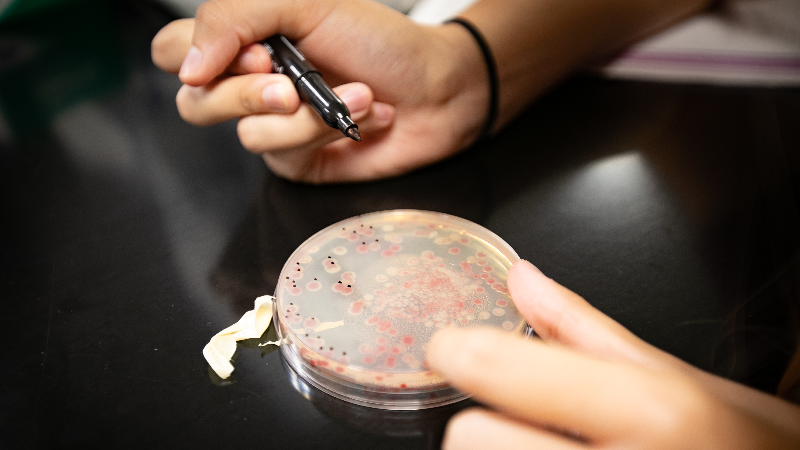Did you know that your microbiome can influence your diet, health conditions and even mental health? 
Dr. Babur Mirza, Missouri State University associate professor of biology, recently got to explain how microbiome affects our health to 50 eighth grade students. For the second year, Mirza hosted Springfield Public Schools’ Health Sciences Academy students for a hands-on learning experience in his laboratory.
“I love teaching students. It’s one of my passions,” he said. “We need more bright people in this area so we can address future challenges in microbial ecology and environmental contamination.”
Shedding light on microbiomes
A microbiome is a community of organisms that naturally exist in a living being. Mirza began his workshop by sharing with the students about the human microbiome.
“We discussed how microbiomes in humans vary by geographic region,” he said. “Microbiomes vary in people from Asia, Africa, Europe, etc.”
He also explained how microbiomes can affect health.
“We discussed how the food we eat can influence the gut microbiome, which in turn can alter our health,” Mirza said.
He found the students to be very engaged participants.
“I thought we’d take 15 or 20 minutes to discuss, but we spoke for an hour and a half,” he said. “They kept asking questions. It ignited their interests and introduced them to a new field.”
Applying knowledge
Mirza allowed the students to apply what they learned about their own microbiomes. They picked a surface to test for microorganisms.
“Some tested their cell phones, their skin, their shoes, the doorknob and even the bathroom,” he said.
He incubated the students’ samples and then allowed them to practice isolating specific organisms.
“This is special because they wouldn’t otherwise have the expertise, skills or resources to do this experiment on their own,” he said.
According to Mirza, the microbiology field is ever-expanding.
“This is one of the best times to study host-microbiome interactions or microbial ecology,” he said. “There are a lot of advanced DNA sequencing techniques and technologies to study microbiomes.”
He hopes the students will gain an appreciation for Missouri State through this experience on campus.
“It’s a good thing to disseminate knowledge, but it’s also a good recruitment tool for MSU,” he said. “Students can use our resources and experience the MSU environment.”
Learn more about the department of biology
Discover more from CNAS NewsWatch
Subscribe to get the latest posts sent to your email.

